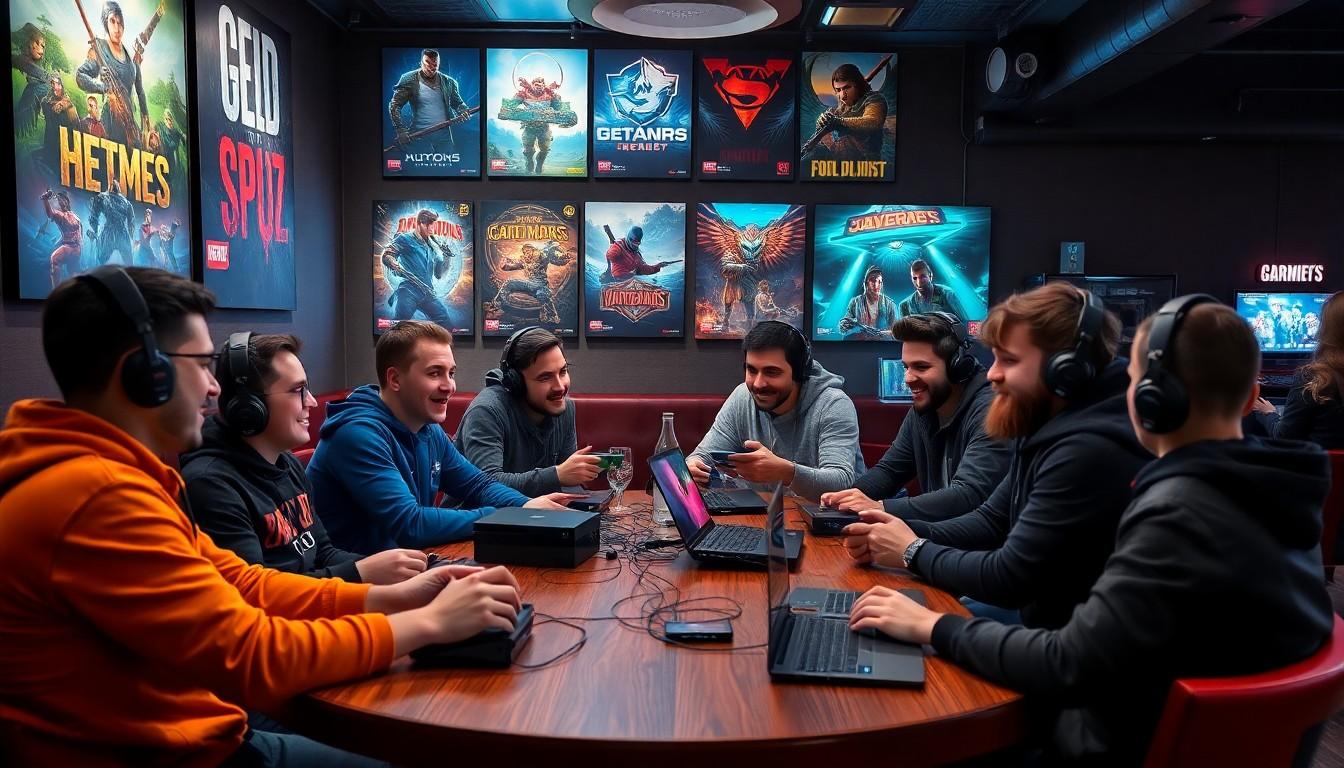Gaming Community Manager Jobs: Unlock Your Career in the Exciting Gaming Industry

In the vibrant world of gaming, where every pixel matters and every player has a voice, the role of a community manager is nothing short of heroic. Picture someone juggling memes, moderating forums, and crafting the perfect tweet—all while keeping the peace among passionate gamers. It’s a job that blends creativity with strategy, all while dodging the occasional virtual fireball.
Gaming Community Manager Jobs
Gaming community managers fulfill essential roles within the industry. They engage and nurture player communities, fostering positive interactions and collaboration among gamers.
Responsibilities of a Gaming Community Manager
Handling community interactions demands strong communication skills. Community managers respond to player inquiries, ensuring timely and informative responses. They moderate forums, maintaining a respectful environment while enforcing community guidelines. Curating content for social media enhances visibility and fosters engagement with the brand. Additionally, organizing events and tournaments creates a vibrant community atmosphere. Monitoring feedback allows managers to relay player insights, helping teams improve game experiences. Overall, community managers balance many responsibilities to enhance player satisfaction.
Required Skills and Qualifications
Expertise in communication represents a core requirement for gaming community managers. Strong interpersonal skills facilitate effective interactions with diverse player demographics. Familiarity with social media platforms contributes to developing targeted engagement strategies. Analytical skills aid in interpreting player feedback and identifying trends. Knowledge of gaming culture and industry trends keeps managers relevant and connected. Understanding conflict resolution techniques helps navigate disputes among community members. A background in marketing or public relations can also enhance a manager’s ability to promote the game effectively.
Importance of Community Management in Gaming

Community management plays a critical role in the gaming sector, directly influencing player satisfaction and overall game success. It cultivates an environment where gamers feel valued and heard.
Building Player Engagement
Effective community managers foster player engagement through interactive social media content and live events. Engaging players leads to increased participation in forums and discussions. They utilize feedback to implement new features or improvements, keeping gamers invested. Additionally, community managers create initiatives that encourage user-generated content like fan art and gaming videos, amplifying community involvement. Gamers often feel a stronger connection to the game when they can express their creativity and relate to other players.
Enhancing Game Longevity
Community management significantly enhances game longevity by maintaining player interest over time. Managers gather insights from players, helping developers understand trends and preferences. Gathering this data enables adjustments in gameplay that align with community desires, maximizing retention. Moreover, they organize events and updates that keep the gaming experience fresh and exciting. By nurturing a thriving community, managers ensure players remain engaged with the game, ultimately leading to a robust and sustainable gaming environment.
Career Path and Opportunities
Gaming community management offers diverse career opportunities that evolve with experience. A clear path exists for both entry-level and advanced roles in this dynamic field.
Entry-Level Positions
Entry-level positions serve as a gateway into gaming community management. Responsibilities often include monitoring forums, responding to player inquiries, and assisting with social media content. Candidates typically hold a degree in communications, marketing, or a related field. Familiarity with gaming culture enhances their effectiveness. Additionally, some companies may offer internships for hands-on experience, allowing newcomers to develop essential skills in community engagement and moderation.
Advancement to Senior Roles
Advancement to senior roles is achievable through dedication and experience. Managers often transition to titles like Lead Community Manager or Community Director. These positions involve strategic planning and deeper engagement with players. Strong performance in gathering player feedback becomes crucial for these roles. Additionally, leadership skills become increasingly important as community managers lead teams and shape community strategy. Many senior professionals enhance their knowledge through industry conferences and networking, staying current with trends and best practices.
Challenges Faced by Gaming Community Managers
Gaming community managers encounter various challenges that impact their effectiveness in fostering player engagement.
Managing Toxic Behavior
Toxic behavior represents a significant hurdle for community managers in gaming environments. Moderating forums requires they address harassment and negativity to maintain a positive atmosphere. Community managers must implement strict guidelines, identifying and removing offenders swiftly. Regularly analyzing player interactions helps in spotting trends that escalate toxicity. Encouraging positive dialogue through initiatives promotes supportive interactions among gamers. Traits like empathy and conflict resolution are essential for these managers as they navigate challenging situations. Proactive measures, including educational resources and community campaigns, often reduce instances of toxicity.
Balancing Community Needs with Game Development
Community managers frequently face the task of aligning player needs with game development goals. Communication skills play a vital role when conveying player feedback to developers. Managers bridge the gap between passionate gamers and production teams, ensuring player voices are heard. Regular gathering of insights informs developers about desired features and improvements. Managers must prioritize requests based on their feasibility and impact on gameplay. Understanding both community sentiments and development constraints enables effective negotiations. Events and discussions often facilitate collaboration, fostering a sense of ownership among players.
Player Experience
Gaming community manager jobs are pivotal in shaping the player experience. These professionals not only engage with gamers but also serve as a bridge between the community and game developers. Their ability to nurture relationships and foster positive interactions is essential for maintaining a vibrant gaming environment.
As the gaming industry continues to evolve, the demand for skilled community managers will only grow. With the right blend of creativity and strategy, they can enhance player satisfaction and contribute to the success of games. For those looking to enter this dynamic field, a commitment to ongoing learning and adaptation will be key to thriving in this exciting career path.



